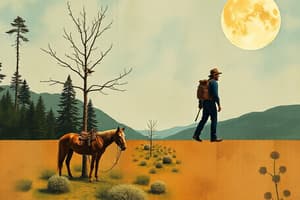Podcast
Questions and Answers
Aldo Leopold was born in Iowa in ______
Aldo Leopold was born in Iowa in ______
1887
In 1909, Leopold graduated from Yale University with a degree in ______
In 1909, Leopold graduated from Yale University with a degree in ______
forestry
As a professional forester, Leopold made significant contributions to fire management, reforestation efforts, and wildlife habitat ______
As a professional forester, Leopold made significant contributions to fire management, reforestation efforts, and wildlife habitat ______
restoration
Leopold's concept known as the Land Ethic emphasizes respecting human interdependence with other species and their ______
Leopold's concept known as the Land Ethic emphasizes respecting human interdependence with other species and their ______
Leopold's ideas had a profound impact on the emerging ______ movement
Leopold's ideas had a profound impact on the emerging ______ movement
As an author, educator, and public speaker, Aldo Leopold promoted responsible resource stewardship by encouraging people to develop relationships with ______ ecosystems through observation and appreciation.
As an author, educator, and public speaker, Aldo Leopold promoted responsible resource stewardship by encouraging people to develop relationships with ______ ecosystems through observation and appreciation.
One major contribution of Aldo Leopold was his book A Sand County Almanac, first published ______ in 1949.
One major contribution of Aldo Leopold was his book A Sand County Almanac, first published ______ in 1949.
Through his book A Sand County Almanac, Aldo Leopold helped shape modern thinking around how humans interact with the environment and how we might better manage our use of ______ resources.
Through his book A Sand County Almanac, Aldo Leopold helped shape modern thinking around how humans interact with the environment and how we might better manage our use of ______ resources.
The legacy of Aldo Leopold extends far beyond his immediate lifetime, with many organizations bearing his name, such as The Wilderness Society and the Leopold Foundation, which are focused on ______ conservation efforts.
The legacy of Aldo Leopold extends far beyond his immediate lifetime, with many organizations bearing his name, such as The Wilderness Society and the Leopold Foundation, which are focused on ______ conservation efforts.
There are several universities named after Aldo Leopold, including the School of Natural Resources at the University of ______-Madison.
There are several universities named after Aldo Leopold, including the School of Natural Resources at the University of ______-Madison.
Flashcards are hidden until you start studying
Study Notes
Aldo Leopold was born in Iowa in 1887. His family moved frequently during his childhood due to his father's profession as a professor of biology, which exposed him to various natural environments across America. This exposure significantly influenced his future work as a naturalist and environmental philosopher. In 1909, he graduated from Yale University with a degree in forestry and began working for the U.S. Forest Service soon after. He served under Gifford Pinchot as one of three original regional foresters in charge of planning and implementing new policies for what would become the National Park Service. During this time, he also earned a PhD from Harvard University.
As a professional forester, Leopold made significant contributions to fire management, reforestation efforts, and wildlife habitat restoration. However, it wasn't until later in his career that he developed a concept known today as the Land Ethic, which is central to his philosophy on managing land sustainably. This ethic emphasizes respecting human interdependence with other species and their habitats, often referred to as "biotic communities," while developing landscapes that can support multiple uses over generations. It became particularly important in the context of population growth and increasing demand for land resources.
Leopold's ideas had a profound impact on the emerging conservation movement. As an author, educator, and public speaker, he promoted responsible resource stewardship by encouraging people to develop relationships with local ecosystems through observation and appreciation. One major contribution was his book A Sand County Almanac, first published posthumously in 1949, which has since been considered foundational reading material for issues related to ecological balance and human interactions with nature. Through this book and others, like Game Management, he helped shape modern thinking around how humans interact with the environment and how we might better manage our use of natural resources.
The legacy of Aldo Leopold extends far beyond his immediate lifetime. Today, many organizations bear his name - such as The Wilderness Society, founded in 1935; the Leopold Foundation, established in 1963; and even the term 'leopoldian' used among practitioners of sustainable agriculture. Additionally, there are several universities named after him, including the School of Natural Resources at the University of Wisconsin-Madison. Overall, Leopold's enduring importance lies in how he framed and advanced discussions about humanity's relationship with the earth's diverse living systems and its inhabitants.
Studying That Suits You
Use AI to generate personalized quizzes and flashcards to suit your learning preferences.



